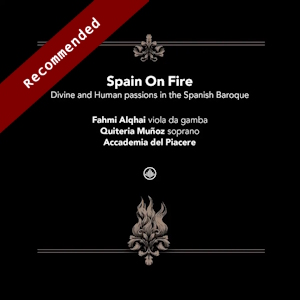
Spain On Fire
Divine and human passions in the Spanish Baroque
Quiteria Muñoz (soprano)
Accademia del Piacere/Fahmi Alqhai
rec. Espacio Turina & Espacio Maravillas, Seville, Spain
Texts included but no translations
Reviewed as lossless download
Challenge Classics CC720018 [61]
This is somewhat removed from my normal listening, and I think I was mainly prompted to sample it because of an upcoming first visit to the Iberian peninsula. I had tried other early music explorations of national cultures, alas not very successfully, because the music chosen had little variation. Here the combination of songs and instrumental pieces works brilliantly because there is a great variety of rhythms, moods and sounds. Dance rhythms dominate, the booklet notes describing the growing popularity of peasant and slave dances in Spanish music in the early Baroque.
I don’t have the background to discuss technical aspects of the music, so can only give you my response in terms of the pleasure of listening to it. And pleasure is an understatement, because from the very start, I loved what I was hearing. Not everything is old; two works are modern compositions, and several of the pieces have been arranged, but they blend in perfectly with the old works. The booklet only provides the texts in Spanish for the eight songs and while I could have laboriously copied them into a translation service, I chose not to, being content to simply enjoy the singing of soprano Quiteria Muñoz.
It is difficult to pick highlights, as the quality of the works is very consistent. However, if you were to press me for one track that best illustrates the recording, I would offer de Briceño’s passionate song La bella Çelia que adora. Let me warn you that the track starts, for no obvious reason, with Quiteria Muñoz reciting the first two verses before the music starts. So find somewhere that offers the whole track, and I have no doubt that you will be entranced by the beauty of the music, the purity and power of Muñoz’s voice and the rich, dark tones of the Accademia’s accompaniment.
The Accademia del Piacere comprises just six players, including director and gambist Fahmi Alqhai (the other are two viola da gambists, Baroque guitarist, harpsichordist and percussion). The sound they make fills the soundstage very well, and the quality captured by the engineer is excellent. With limited previous experience to guide me, I can only say that Quiteria Muñoz sings beautifully, soulfully, passionately and spiritedly as required. My only negative comment would be about the booklet notes. I have already mentioned the absence of translations, and they are also lacking in information on the music itself, as they comprise only a couple of pages of general background about the cultural aspects of Spain in its Golden Era.
But it is the music and the performances that are of most importance, and they are a delight from first note to last.
David Barker
Buying this recording via a link below generates revenue for MWI, which helps the site remain free



Contents
Henry de Bailly (1590-1637)
Yo soy la locura
Carles Blanch (b. 1993) / Fahmi Alqhai (b. 1976)
Tarantela & Canarios
Luis de Briceño (fl. 1610-1630)
Ay, amor loco
Giovanni Battista Vitali (1632-1692) / Fahmi Alqhai
Glosa en canon sobre el Passa Galli de Vitali
Antonio de Cabezón (1510-1566)
Diferencias sobre el canto llano del cavallero
Santiago de Murcia (1673-1739) / Carles Blanch
Folías gallegas
Fahmi Alqhai
Folías de España
Luis de Briceño
La bella Çelia que adora
Alonso De Mudarra (1510-1580) / Fahmi Alqhai
Glosa e improvisación sobre Conde Claros
José Marín (1618-1699)
Niña, como en tus mudanzas
Antonio Martín y Coll (1650-1734)
Bayle del Gran Duque
Flores de música (1706) – Pasacalles
Mateo Flecha the Elder (1481-1553)
La Negrina
Anonymous / Antonio de Cabezón
Himno Pange Lingua ‘More Hispano’ y su glosa
All arrangements by Fahmi Alqhai

















